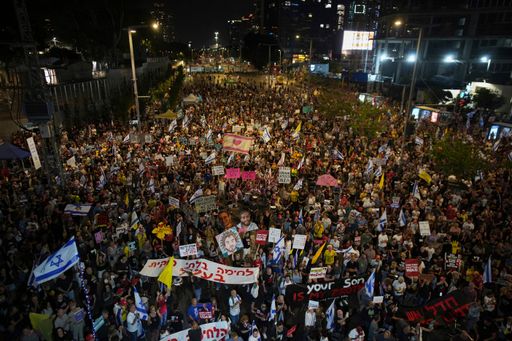US President Trump Announces Potential Ceasefire Between Israel and Hamas
On Tuesday, President Donald Trump revealed that Israel has tentatively agreed to a new 60-day ceasefire with Hamas, aiming to facilitate discussions that could potentially end over 20 months of conflict in Gaza. The announcement comes amid ongoing tensions and military actions in the region, with Trump emphasizing that the United States will engage with both parties during this period to foster a resolution.
Despite the announcement, neither Israel nor Hamas has officially accepted the ceasefire proposal. Trump has issued a warning to Hamas, indicating that failure to accept the terms could worsen their situation. The specific conditions that Israel has agreed to remain unclear, leaving many questions about the feasibility of the proposed truce.
Ceasefire Proposal Details
The ceasefire proposal is not entirely new; it appears to be a modified version of a framework introduced earlier this year by Trump's Middle East envoy, Steve Witkoff. Trump stated in a social media post that Qatar and Egypt are actively working on the details and will present a final proposal to Hamas.
According to an Egyptian official involved in the negotiations, the proposal includes a stipulation for Hamas to release ten additional hostages during the two-month ceasefire—eight on the first day and two on the final day. In exchange, Israel would withdraw troops from certain areas of Gaza and allow critical humanitarian aid to flow into the territory.

The Egyptian official, who spoke on the condition of anonymity, noted that a previous sticking point regarding the distribution of aid has been resolved. Both sides have reportedly agreed that the United Nations and the Palestinian Red Crescent will oversee aid operations, while the controversial Gaza Humanitarian Foundation, backed by Israel and the US, will continue its operations.
Israel's Position on the Ceasefire
Israeli Foreign Minister Gideon Saar expressed the government's commitment to reaching a deal with Hamas to conclude the war in Gaza and secure the return of hostages. Saar stated, "We are serious in our will to reach a hostage deal and a ceasefire. We said yes to (US) special envoy (Steve) Witkoff’s proposals."
Saar acknowledged some positive developments but emphasized that Hamas must be pressured to comply. He urged the international community to support American initiatives and dispel any misconceptions Hamas may have regarding its position.
Netanyahu's Hardline Stance
Prime Minister Benjamin Netanyahu reiterated his firm stance on the conflict, asserting that "there will be no Hamas" following the proposed ceasefire. He emphasized that Israel would not revert to the previous status quo, which he referred to as "Hamastan." Israeli leaders believe that the ceasefire deal may involve a partial withdrawal of Israeli forces from Gaza and an increase in humanitarian aid to the region.
However, the Israeli government has not committed to engaging in peace talks as part of the ceasefire proposal, raising concerns about the long-term viability of the agreement.
Hamas's Response to the Proposal
In response to the ceasefire offers from mediators Egypt and Qatar, Hamas stated that it is currently reviewing the proposals. The group aims to reach an agreement that would ensure an end to the conflict and facilitate an Israeli withdrawal from Gaza. A source close to Hamas indicated that the group's leadership is expected to debate the proposal and seek clarifications from mediators before issuing an official response.
Timing of the Ceasefire Proposal
Trump's push for a ceasefire comes at a critical juncture, as he has made it clear to Israel that he desires a swift resolution to the Gaza conflict. While he has shown support for Netanyahu, Trump has also expressed concerns about Israel's military response to recent provocations, urging a more measured approach that could encourage Hamas to accept a ceasefire.
A US diplomat involved in the negotiations noted that there is now a "big opportunity" to reach an agreement. Trump's tough rhetoric toward Israel has reportedly instilled some confidence in Hamas that the US will uphold any future deal and prevent a resurgence of hostilities.

Challenges Ahead
Despite the optimism surrounding the ceasefire proposal, significant challenges remain. An Egyptian official revealed that Israel has yet to agree to withdraw its forces to positions held prior to a previous ceasefire that expired in March. Since then, the Israeli military has expanded its control over large areas of Gaza, intensifying pressure on Hamas.
Previous ceasefires have struggled to hold, with a January agreement failing to progress beyond initial phases that included limited hostage exchanges and aid deliveries. The second phase, which would have required Hamas to release all remaining hostages in exchange for Palestinian prisoners and a lasting ceasefire, never materialized, leading to renewed hostilities.
The ongoing conflict has resulted in a devastating humanitarian crisis in Gaza, with over 57,000 Palestinians reported killed, the majority of whom are civilians. The entire population of 2.3 million has been displaced, exacerbating the dire situation. Residents express a deep yearning for relief, with one individual stating, "We are seriously tired," after enduring relentless suffering.
As the situation unfolds, the world watches closely to see if this latest ceasefire proposal can bring about a lasting peace in a region long plagued by conflict.



















